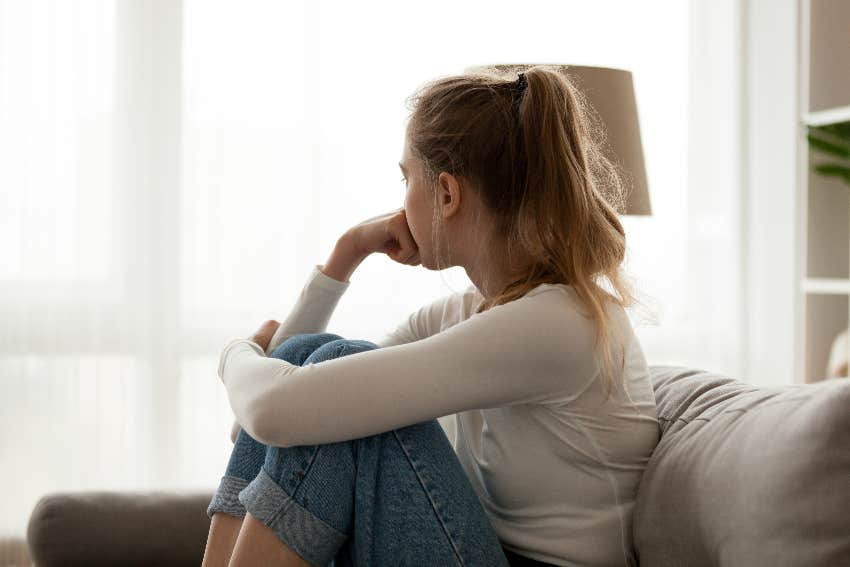8 Physical Signs Your Anxiety Isn't Just In Your Head
How anxiety can wreak havoc on your whole physical body, too.
 Máximo | Canva
Máximo | Canva You're probably familiar with the symptoms of anxiety: feeling worried, racing thoughts, and being irritable. But while being anxious may seem like it's all in your head, it can manifest itself into physical symptoms that derail your everyday life.
Mental disorders can have a major impact on your physical health. Whether you suffer from generalized anxiety disorder, panic disorder, social anxiety, or some variation of anxiety not specified in the DSM-5, which is used by healthcare professionals to diagnose mental disorders, you may experience any one of these symptoms. We spoke to mental health professionals who outlined what anxiety feels like via the biggest physical symptoms associated with anxiety.
Here are the signs your anxiety isn't just in your head:
1. Increased heart rate
This is one of the most common symptoms of anxiety: when your fight-or-flight response kicks in, this ups your heart rate, sometimes leading to heart palpitations.
"In the short term, our heart rate and breathing increases, and adrenaline floods through our body to give us energy to fight or run away," explained Sarah Allen, PhD, a Chicago-area psychologist who specializes in treating anxiety and stress. "That is useful for dangerous situations, but typically we don't face that sort of situation; our mind is just telling our body that our thought is dangerous, and so we find that this anxiety response is activated in inappropriate settings like traffic or during a stressful conversation."
Dr. Allen explained that if this happens occasionally, there is no long-term harmful effect on your body. However, if this is a persistent symptom, you should see a doctor to avoid further complications.
2. Muscle tension
 fizkes / Shutterstock
fizkes / Shutterstock
When that adrenaline pumps through your body, it can cause your muscles to tense up, resulting in knotted muscles in your back or neck, explained Sari Chait, PhD, clinical psychologist and consultant.
Psychological research extensively supports a strong link between muscle tension and anxiety. A 2012 study showed that individuals experiencing anxiety often exhibit increased muscle tension, particularly in the neck, shoulders, and jaw, and that this tension can be a prominent symptom of generalized anxiety. When someone feels anxious, their body naturally tenses up as part of the fight or flight response.
3. Headaches
The tensing up of your muscles, especially in your neck, can lead to headaches or even migraines. Dr. Chait said getting headaches from anxiety is pretty common.
4. Feeling dizzy and lightheaded
Dr. Chait explained that feeling dizzy or lightheaded happens frequently with anxiety, along with the other symptoms listed here.
A 2024 study showed that anxiety can directly trigger dizziness through physiological changes like increased heart rate and hyperventilation, while experiencing dizziness can also exacerbate anxiety levels, creating a potential cycle between the two symptoms. Anxiety can cause dizziness, and dizziness can worsen anxiety.
5. Change in appetite
"Some people experience a change in their appetite when they're anxious, either eating way more than usual or significantly less than usual," Dr. Chait said. If you're an emotional eater, you may find yourself turning to your favorite comfort foods to help you feel better. If this sounds like you, try our helpful trick to help curb emotional eating.
6. Butterflies in your stomach
 Perfect Wave / Shutterstock
Perfect Wave / Shutterstock
This is a common symptom of anxiety: that uncomfortable feeling in your stomach that comes along with nerves and is associated with the fight-or-flight response, explained Brian Cassmassi, MD, licensed psychiatrist in Los Angeles.
There is a powerful gut-brain connection — your brain has a direct effect on the stomach and intestines, including how feelings of anxiety can lead to stomachaches and GI issues.
The sensation of butterflies in your stomach and anxiety, primarily due to the gut-brain axis, allows for direct communication between the brain and the gastrointestinal system, meaning that emotional states like anxiety can manifest as physical sensations in the stomach. A 2023 study concluded that feeling butterflies is often associated with stressful or nerve-wracking situations.
7. Diarrhea and/or constipation
If your anxiety is bad enough, the butterflies in your stomach could lead to full-on GI issues, such as irritable bowel syndrome (IBS) with diarrhea and/or constipation, Dr. Cassmassi said.
"Serotonin is the neurochemical that controls both gut activity as well as mood and anxiety, so the reduced serotonin in chronic anxiety states also can wreak havoc on the gut," Dr. Cassmassi explained.
8. Fatigue
While some people may feel wired when they're anxious, fatigue is a common symptom of anxiety, Dr. Chait said.
"When feeling anxious, some people feel pretty fatigued, which is worsened by the emotional drain of anxiety," she explained. "Despite this fatigue, anxiety also causes sleep difficulty for a lot of people, so there is a vicious cycle of feeling tired but not getting enough sleep, which leads to feeling even more fatigued."
A 2022 study showed that experiencing fatigue can significantly increase the likelihood of experiencing anxiety symptoms and vice versa. This connection is often attributed to the physiological changes triggered by anxiety, like the fight-or-flight response, which can lead to feelings of exhaustion. In contrast, poor sleep quality caused by anxiety further contributes to fatigue.
If this sounds like you, try a weighted blanket to help soothe you to sleep. If that doesn't work, try a breathing technique or other wind-down routines that can help ease anxiety. Ultimately, you should work with your mental healthcare provider to create a treatment plan that will help relieve your anxiety and help you get a good night's sleep.
If you or somebody that you know is experiencing a mental health crisis, there is a way to get help. Call SAMHSA’s National Helpline at 1-800-662-HELP (4357) or text "HELLO" to 741741 to be connected with the Crisis Text Line.
Christina Stiehl is a writer, editor, and content strategist with more than 10 years of professional journalism experience. Her work has appeared in SELF, VICE, SHAPE, Men's Health, Thrillist, and more.

